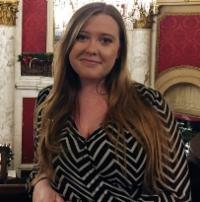Kristen Sweet graduated from Quinnipiac University School of Law in 2013 with a concentration in civil advocacy and dispute resolution with honors. However, Ms. Sweet wasn’t always sure she wanted to go to law school. She graduated from college in 1992, and immediately went to work in the entertainment industry as a stage manager for live productions for 15 years. Her work brought her to Seattle, New York City and Connecticut. After her daughter was born, Ms. Sweet shifted focus in the entertainment industry and began working in payroll, sales and marketing in Los Angeles. In 2008, Kristen realized a lot of the work she was doing involved contract negotiations and began to wonder if she could cut out the middlemen and do these negotiations herself. So Ms. Sweet started to explore going to law school. She knew she never wanted to be an attorney who did day-to-day work in the court system; she thought agreements could be much better reached if the parties involved had an actual say in the matter. When she began looking at law schools, Ms. Sweet only looked, therefore, at schools with strong alternative dispute resolution programs. When she looked at Quinnipiac, she was extremely impressed with the school’s Center on Dispute Resolution. She talked to Dean Brown (back then, Professor Brown) about her work and goals with respect to the center, and what it meant to look at the whole lawyer and how we interact with one another in the practice of law. In 2010, Ms. Sweet officially enrolled at Quinnipiac University School of Law and began her transition from theater sales and marketing to the legal field.
While in law school, Ms. Sweet became the second student fellow to work for Quinnipiac’s Center on Dispute Resolution. She did an externship with the Commission on Human Rights and Opportunities, working as a mediator doing employment discrimination. For classes, Ms. Sweet took as many ADR and employment law classes as she could. While she was working in the entertainment industry, she was a union member and decided that, while in law school, she wanted to use the knowledge and experience she already had in employment law and combine it with ADR work in that field. Ms. Sweet’s daughter was 10 years old when she started law school, and when asked about what that was like, Ms. Sweet noted that it definitely wasn’t easy raising a daughter while in law school, but she “just did it.” She reflected fondly on the study dates they would have together, and how grateful she was for her classmates and Quinnipiac faculty and staff being so supportive of her while she was doing it.
Following graduation, Ms. Sweet began working for an employment labor law firm in Hartford. The firm was management focused, and while Ms. Sweet was grateful for the time and experience she got there, she realized that she would much prefer working as either a neutral or an advocate on the employee end of the spectrum. Today, Ms. Sweet works for the United Public Service Union as a union attorney. She puts her ADR skills to work when she does contract negotiations or represents union members in mediations and occasional arbitration proceedings. She enjoys working hard for her clients in these negotiations and mediations. She’s found that a lot of what she learned in law school, she now gets to apply to her work, and she loves it.
Ms. Sweet thinks that parties are more open to negotiating and mediating than they were a decade ago. In employment law, and specifically labor relations, she noted that you always
need to consider that the parties have an ongoing relationship, and the employer and employees involved in these processes are very likely to have a long-term relationship. ADR processes allow her to keep those relationships in mind when she’s advocating for her clients. She’s also found that parties are more understanding of the value mediation offers in resolving these disputes; if the parties are willing to invest in the process and have open conversations, they’ll be more likely to find an outcome with which they both can live.
Outside of her work, Ms. Sweet finds she uses her ADR skills constantly in her everyday life. She noted that her daughter is a great negotiator, skills her daughter likely picked up from her. She thinks ADR really does improve our listening skills, as well as our ability to respond to one another, and increases our curiosity of what is in the mind of others in our lives. These skills, she noted, helps a lot in everyday life, and by using these skills in conversations and disputes with family and friends, you learn to bring a more humane approach to the formal processes. ADR, she said, offers skills that are beneficial in all aspects of life; she’s learned that sometimes treating each other fairly is more important than the outcome.
When asked if she had any advice for students thinking about a career in ADR, she had two simple words of advice: DO IT. Law school is one of the few times we have left in life to explore different things at the same time, so Ms. Sweet encouraged students to take advantage of what law school offers to try new things, hear speakers and do externships. She remembered that, when she wrote a paper for Professor Pillsbury’s Intro to Mediation course, she went out and interviewed mediators about their different styles, and how useful it was for her to talk to these individuals. She recommended that anything we can do to explore and better understand the ADR community, take full advantage of it. And if you find something that’s really cool, do not be afraid to talk to an ADR professor about setting up an independent study to learn more about it. “Let yourself be exhausted,” she recommended, “to take advantage of new opportunities.”










